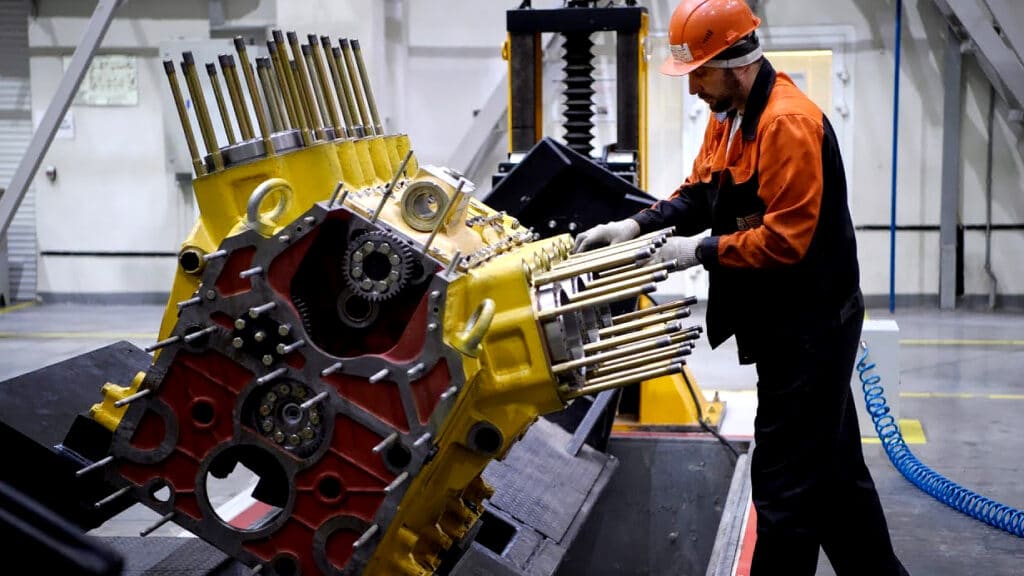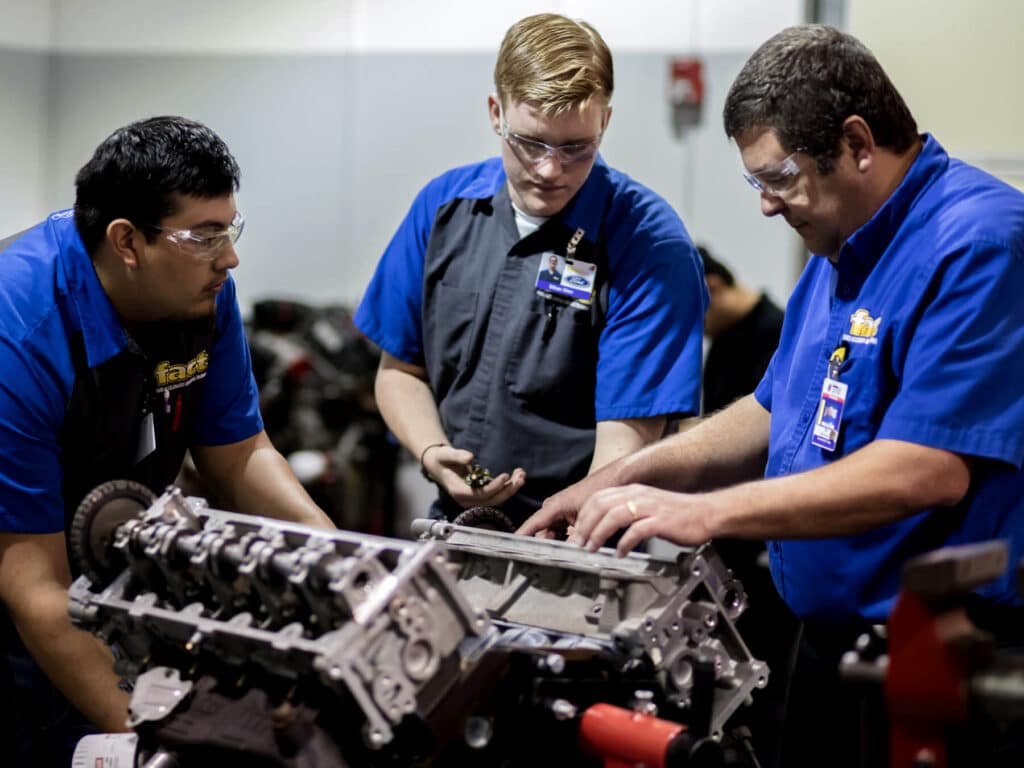Whether you’re trying to figure out how much you can make if you become a mechanic or just want a rough estimate of an auto mechanic’s average salary, we’ll break it all down for you in this article.
Not only will we tell you how much mechanics make but we’ll also shed light on other expenses that go into becoming a mechanic.
You’ll also learn how you can find your way into the business, and we’ll highlight some of the most profitable automotive niches in this guide.
How Much Do Mechanics Make?
According to a report published by the Bureau of Labor Statistics in May 2021, auto mechanics make about $46,880 a year on average, or $22.54 per hour.
Of course, there are a lot of different factors at play here, such as technical expertise, who you’re working for, the cost of living in your area, etc.
For instance, if you live in the District of Columbia the average automotive mechanic makes far more than the average, with the median income settling in at $65,420 per year.
Here are the top 10 state-specific median salaries (per hour) for auto mechanics and technicians in the United States:
- Alaska: $32.03
- California: $28.96
- Hawaii: $22.91
- Colorado: $30.35
- Massachusetts: $30.06
- Delaware: $25.91
- New Jersey: $26.11
- Maryland: $25.77
- Oregon: $28.91
And if you go to West Virginia an average mechanic brings in $32,250 per year. Other factors include whether you run your automotive shop, or whether you work at a dealership or a private repair shop.
Diesel Mechanic Average Salary

While typical automotive mechanics make just under $47,000 a year and about $22.50 an hour, if you’re a diesel technician you can expect to bring in a little bit more.
That’s because the Bureau of Labor Statistics puts the average pay for a diesel mechanic at $48,690 per year, which translates to about $23.41 per hour.
But just like with the average pay of a gasoline automotive mechanic, there are tons of factors that go into how much a diesel mechanic makes.
The highest-paying state for diesel mechanics is Alaska where they bring in a little over $62,000 a year. Meanwhile, in the lowest-paying state, West Virginia, diesel mechanics bring in just over $39,000 per year.
Once again, it also depends on what type of shop you work in since dealerships and private repair shops will pay different rates while providing different benefits.
ASE Certified Mechanic Salary
Another factor you’ll want to consider when you’re trying to determine the average auto mechanic’s salary is whether or not the mechanic has ASE certifications.
Many repair shops will offer a bonus to a mechanic’s hourly rate for the number of certifications they have.
ASE and Journeyman technicians almost always make more money per hour in contrast to unlicensed mechanics. Factory or OEM certifications are the gold standard.
How Exactly Do Mechanics Earn Money?
While we’ve highlighted the average pay rates above, it’s crucial to note that mechanics typically get paid on a “flat-rate” system.
That means you don’t just get money for showing up, instead, you get paid for the work you complete.
There’s an expected amount of time to complete a job, and if a mechanic completes the job faster, they still get paid for the expected amount of time.

However, if it takes them longer than that then they still only get paid for the expected amount of time to complete the job.
Furthermore, if there’s no work to complete at the shop, then the mechanic doesn’t get paid at all.
In short, the “flat-rate” system pays the mechanic only for the actual work they complete and the amount of time it should take them to complete that work.
It’s a great pay system for highly proficient mechanics who can quickly complete work. But as new mechanics learn and try to figure things out, it doesn’t always lead to higher paychecks.
Is Automotive Repair a Good Career?
If you’re looking for a career field that’s going to get you rich, becoming an automotive mechanic isn’t it.
But just because you aren’t going to bring in gobs of money doesn’t make it a bad career choice.
It’s an excellent choice for those who want to work with their hands to earn their paycheck. It’s rewarding but also physically demanding.
Spending large portions of your day busting knuckles and bending over engine bays can be physically demanding work, so just know what you’re getting yourself into.
High Paying Automotive Repair Niches

When you’re trying to figure out how much car mechanics make, one of the most important questions you need to ask yourself is what automotive niche are you looking at.
The numbers we’ve highlighted above are for general-purpose mechanics, meaning they fix just about anything that comes into the shop.
However, if you get extremely proficient at a particular task you can specialize, and often those mechanics will make far more.
Some of the high-paying niches in the automotive career field include electrical, performance tuning, and car modifications, from performance to advertising customizations like vinyl wraps.

While you typically need a higher skill set to perform in these areas, if you can master them you can pick up work at a higher rate, and you should be able to complete the work ahead of schedule.
Since you’re still on a flat rate, that means you can knock out jobs quicker and earn more money, upping your overall salary.
Are Mechanics Rich? Can They Earn 6 Figures?
Look, we’re not saying you can’t earn six figures as a mechanic, it’s just less likely to happen. That’s because the top 10 percent of earners average about $72,000 a year, which is still significantly below the $100,000 mark.
But if you live in an area with a high cost of living, have plenty of experience, and are extremely proficient at your job, it’s possible to bring in six figures.
Just know that if you start bringing in that much money, you’re in the top 1 percent of automotive earners.
Other Expenses Involved
When you’re trying to figure out how much mechanics make, it’s important to take into consideration the other expenses that go into becoming a mechanic.
While you need the expertise and experience to land a job, one thing aspiring mechanics may not realize is that almost every shop out there requires the mechanic to bring their toolbox and tools.

This might not seem like a big deal, but because a high-quality toolbox and tool set can cost between $25,000 and $50,000, that’s no small expense. Home mechanic tool sets and socket sets alone won’t cut it.
Without the right tools, you can’t complete the job, and with subpar tools, it’ll take more time than necessary.
And since mechanics make a flat-rate salary, if it’s taking them longer to complete a job it’s costing them money.
It’s the equivalent of needing to buy a new car to get a job, and then you need to pay off that car with the salary you’re earning.
While it’s an excellent long-term investment for an automotive mechanic, it is a cost you’ll want to take into consideration when you’re trying to get into the business. Even more so if you want to set up your shop.
In that case, you’ll have to invest in car lifts, engine compression tester kits, pressure washers, air compressors, coil spring compressors, and so much more.
Becoming an Auto Mechanic
Now that you know how much mechanics make, it’s up to you to decide if you want to become a professional mechanic. If you do, the first thing you’ll want to do is get some kind of experience.
If you already know what you’re doing, you can jump straight to ASE certifications — that way you have something to highlight to prospective employers.
However, if you don’t, there are plenty of schools that help get you the experience you need.

Schools like UTI specialize in automotive mechanics, and there are plenty of colleges that offer automotive programs to help you get a feel for the career.
Just know that you don’t need an automotive degree to get a job as a mechanic, you just need to know what you’re doing.
While you’re going to school, go ahead and start picking up tools and other things you’ll need for your toolbox.
Once you have the necessary experience, you can start sending applications out! If you’re in an area with plenty of automotive shops, it shouldn’t be too long before someone reaches out to you for an interview.
Final Thoughts
So, how much do mechanics make? It depends on a lot of factors. But now that you have a better idea of how everything works, it’s up to you to decide if it’s a career you want to get into.
You’re not going to make a ton of money, but you get to work with your hands doing something that you love, and that alone makes it an extremely rewarding career field for many people.
Do you have questions about becoming a professional mechanic or have an experience you want to share? We’d love to hear from you! Drop a comment below.

